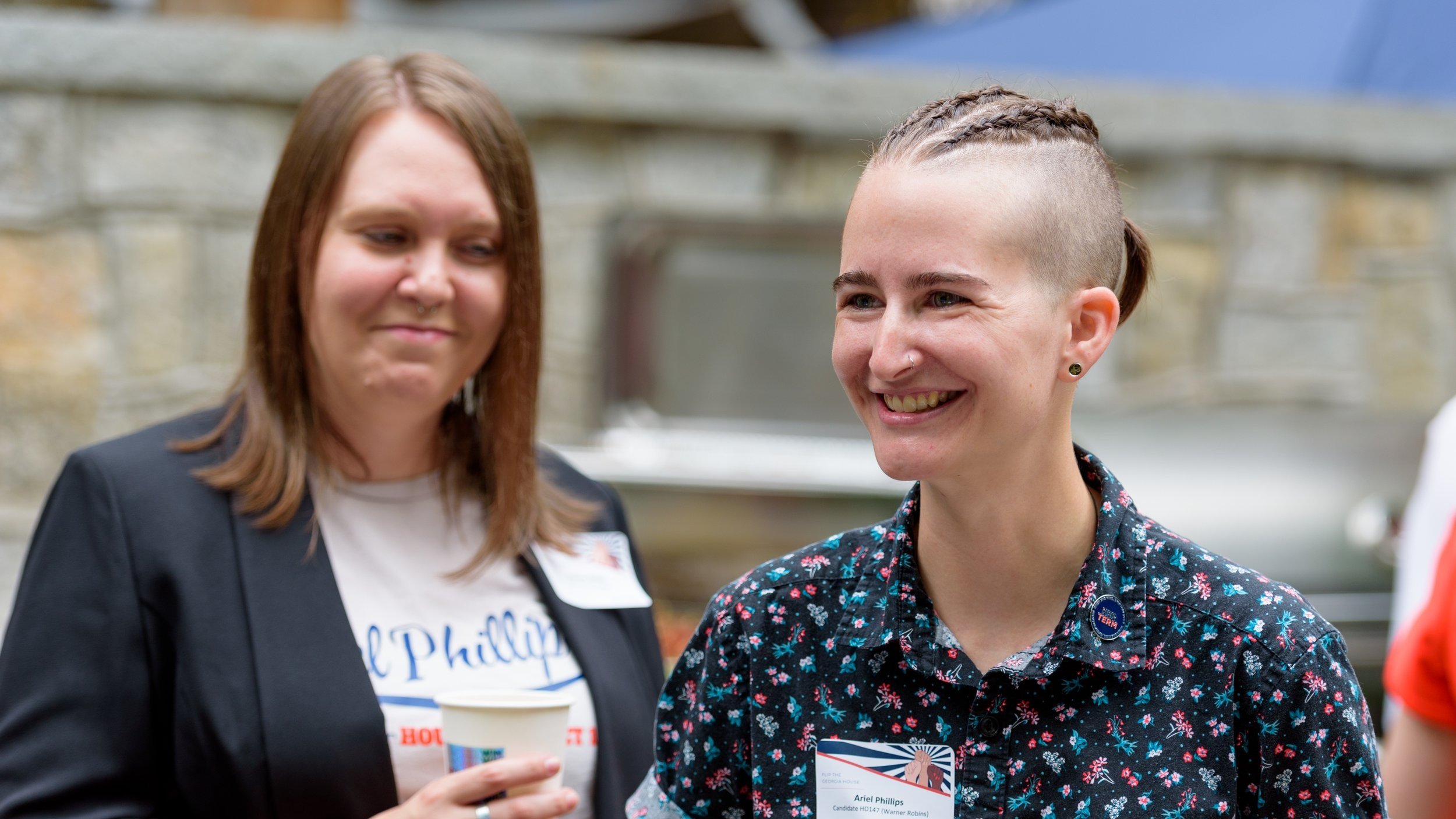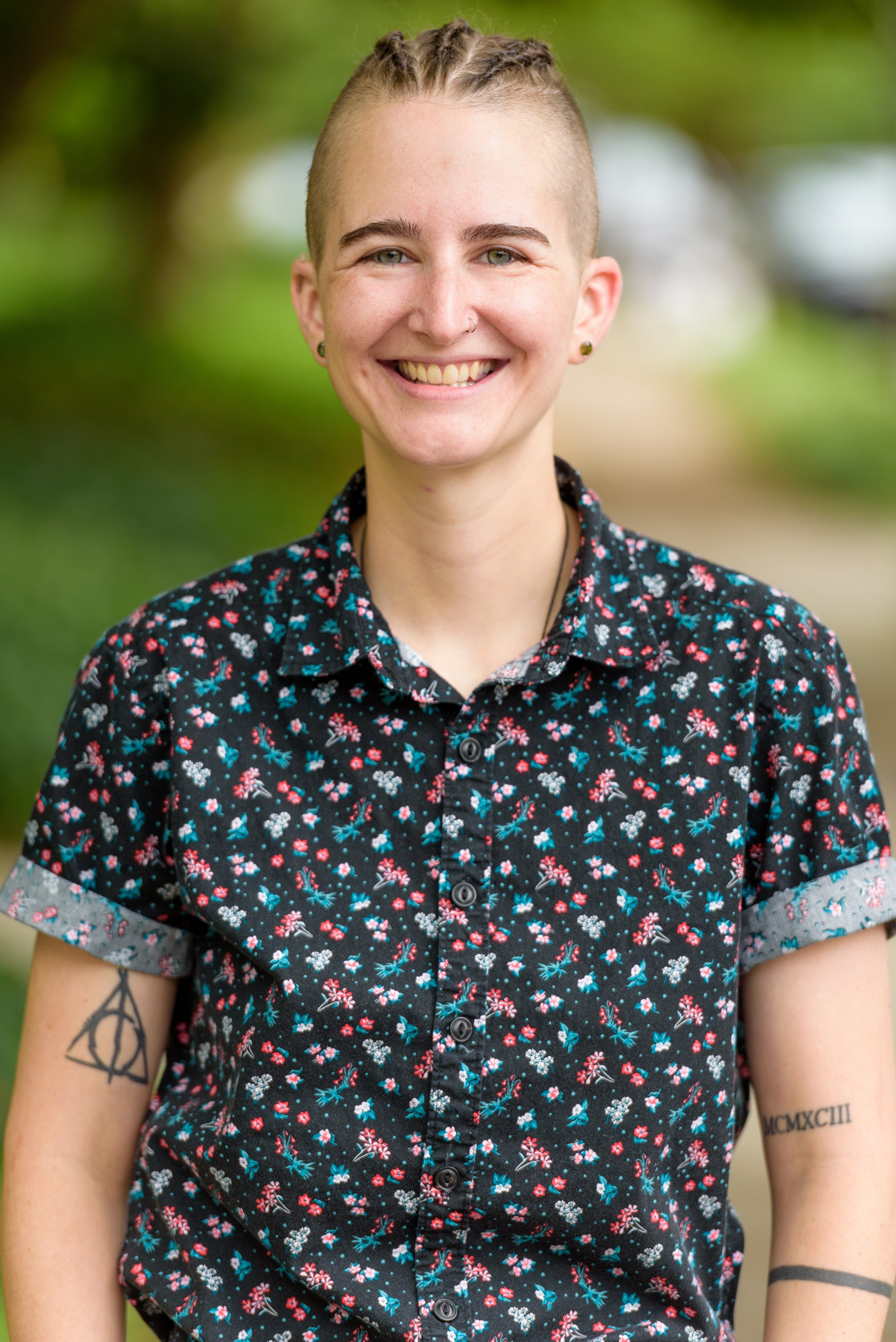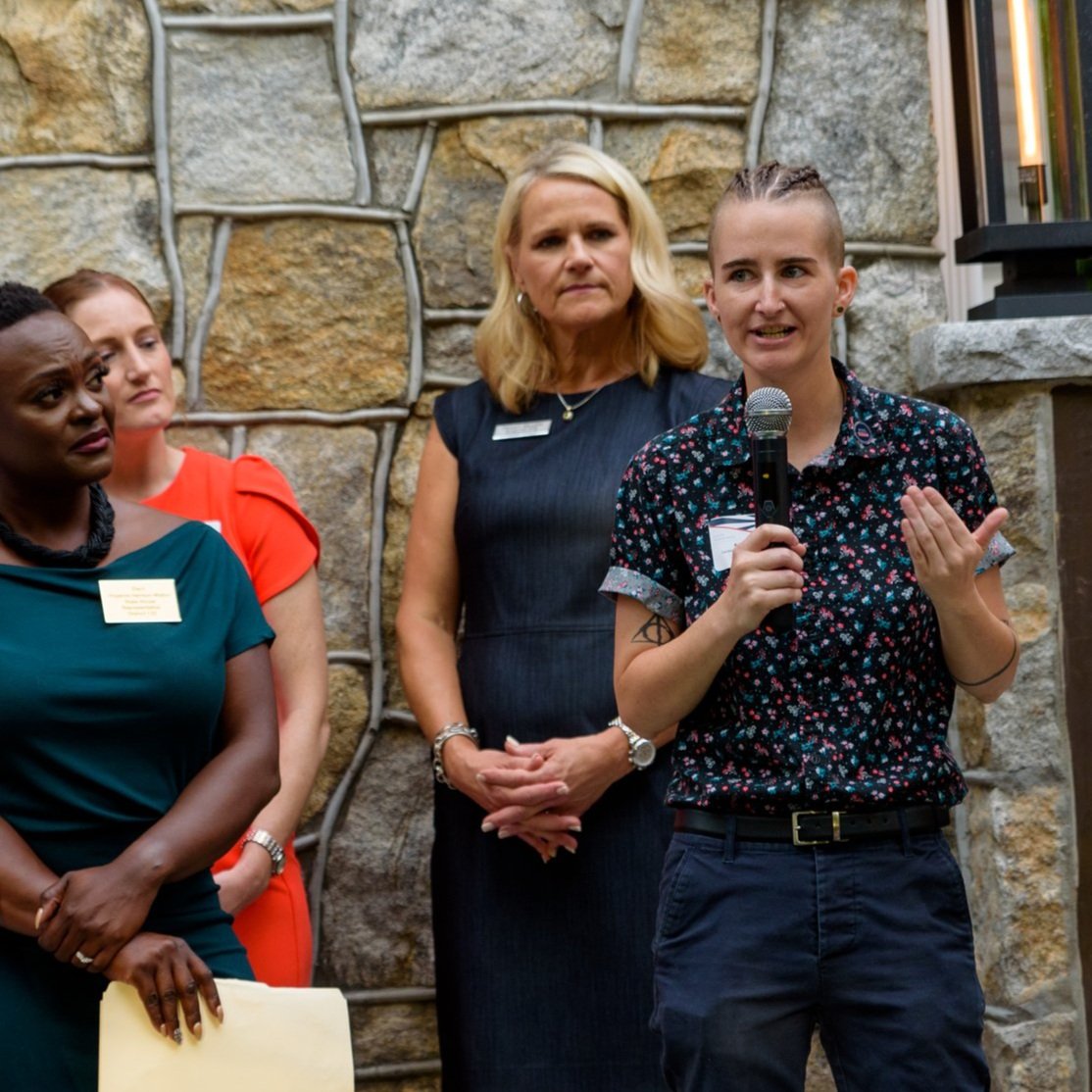This profile is part of a series about candidates for legislative districts we are targeting to flip in November. Ariel Phillips is running for Georgia House District 147 against Bethanny Ballard. Phillips wants to expand voting rights and women’s health; improve worker and veterans’ rights; implement common-sense gun control; and advocate for criminal justice reform.
Her Term’s Motto is, “When she wins, everyone does.” Or perhaps, in this case, we should say “When they win, everyone does.” What does that mean to you?
Traditionally, people who aren’t men haven’t had a seat at the table. The Constitution was written at a time when women didn’t even have the right to vote and a lot of other rights we still don’t have today. Historically, we have discredited the beliefs of half of the population by not giving them a seat at the table. Once we start doing that, we’ll start having more perspective, ideas and ways to solve problems. In the past, we’ve had only one type of person making decisions. Now we have diversity, and I think that breeds innovation. I think diversity is absolutely necessary if we’re going to have a government that is representative of the people. So “she” has to win in order for that to happen.
People tend to look at reproductive health, childcare and some other issues as women’s issues. Can you explain to constituents why these issues should matter to other people, including men, as well?
I have two reasons why I think this is very important. First, there are men who can have children, so it is not a women’s issue. If men can physically have a child, then it’s an everybody issue.
But I also think it’s everyone’s issue in general, because you need two people to have a child. That makes it a parent issue. Of course, I think the person carrying the child has a little more skin in the game, but I think it’s definitely something both parents have to think about in order to make a decision that respects both of their lives.
Why is it important to ensure that people who aren’t men get a voice in your district, and how are you going to do that?
This ties into my answer to the first question: People who aren’t men historically haven’t had a seat at the table. That is especially true for my district. As far back as I can see, there have only been straight, white, Republican men running my district. If we don’t have a government that accurately represents the people it is supposed to represent, it won’t have the foresight to solve problems in communities it is not a part of. If you only have white male Republicans in charge, they aren’t going to know what to do when an issue comes up that doesn’t pertain to their demographic. We need to elect people who accurately represent the diverse communities they are going to serve. There have been so many of the same problems for decades in my district, and we need a fresh perspective to solve them.
What inspired you to run for office? Was there a specific event or chain of events that convinced you?
Around 2016, I realized I wasn’t happy with the state of the world, and I wanted to do something about it. But I wasn’t really able to put a lot of energy into it, because I was still in the military. Then I saw an ad that asked, “Are you interested in running for office?” I checked yes and put my contact information in, and after that, I got periodic text messages asking if I wanted to run for office. Then one day, right before qualifying, I got a text from the Houston County Democratic Committee. Recruiters were going through the list of everyone who ever said they were interested in running for office, hoping they would find anyone who would run for the seat I am running for. Out of the 87 people they called, I was the only one who said yes. I knew I had to step up.
How has being a nonbinary person influenced your leadership?
Being kind of not the “norm” for a candidate has given me the pretty rare opportunity to see people for who they are. For some of the women in Her Term, it is easier to blend in, and people will interact with them like they would normally with anybody. But they make it very clear when they don’t like me. I invoke some very strong emotions, and that is a bias. It’s not me; it’s what they think of me—and what the world has told them about me. My identity has given me the opportunity to see how people react and learn to connect with them in spite of it. People are very vocal on social media. If they feel a certain way about you, they’re going to let you know. It has given me the chance to see what it really is they are attacking and communicate about it human being to human being.
What are the major positions you’re running on, and can you outline your platform for us?
Health care is a critical issue for me, specifically reproductive rights. I am pro-choice, and I am concerned not only with making it legal but with making it more accessible. There are some antiabortion clinics in Macon that are state funded, and they pose as abortion clinics, but when you go, they are run by Church groups that discourage abortion. When it comes down to reproductive rights, it is not just about being pro-choice; it’s addressing and getting rid of these clinics and other harmful measures. Additionally, I want to expand Medicaid, because Georgia is one of the 12 states that have not done so. I think 12 percent of my district doesn’t have health insurance. That is a lot of people who are struggling financially because of medical issues. They don’t have to be struggling from that.
Second, I am in favor of common-sense gun control. I am a disabled veteran from a small town in Mississippi; I know guns, I grew up around guns, and I have guns. However, I’m smart about it. I have been trained very well in how to use them. I want to implement a three-day waiting period, like Canada did. It cut down on domestic abuse a great deal. I also think it will cut down on suicides, because people have a little more time to think, and you may be in a different place mentally than you were three days before. I also believe in mandatory background checks and safety courses; these should just be givens.
Finally, I am passionate about veterans’ and workers’ rights. In our area, it is hard to get a job, especially for veterans. When I got out of the Air Force, I really struggled to find a job in the community. Even when you get a job, the minimum wage isn’t liveable at$7.25. I also believe in collective bargaining for teachers, who make up the only people in Georgia who can’t bargain collectively for their pay. If we’re going to talk about teacher retention, that’s really important to bring up. We should pay teachers what they’re worth.
You are our only candidate who is a veteran, and with Warner Robins having such a large veteran population, can you expand upon veteran-specific issues and what your plan is to address them?
I left the Air Force in 2018 after being in a motorcycle accident. I couldn’t go back to the military after I recovered, because they had diagnosed me with ADHD. So at that point, I was looking for part-time jobs, and it was honestly almost like pulling teeth just trying to get an interview. I was almost a project manager in the military, yet it was incredibly difficult for me to get any sort of service job when I left. There is not enough of a focus on hiring veterans, which is why increasing job opportunities is so important, especially for them. I also think community resources intended to help veterans, such as shelters to help those in the un-housed community, need increased funding and support. The resources are out there, but we need to make sure they are accessible. Additionally, veterans need more mental health resources, so I feel strongly about ensuring the Department of Veterans Affairs has mental health professionals who specialize in veterans’ issues.
Why should people vote for you? Can you explain why you’re a stronger candidate than your opponent?
I don’t like to compare myself to my opponent, because I don’t know her very well. But I can guarantee that between the two of us, I am doing this only because I want to help my community. I don’t want to be a lifelong politician, but I see there are a lot of problems in my community, and I have ideas about how to fix them. I want to get out there and ensure my community is being supported in the way it is supposed to be. That is the job of a representative. I want to direct people to resources in the community and make sure they are being supported. I have an incredible passion for humankind, and I want to amplify the voices of those who have historically been silenced. I’m not doing this for me, I’m doing it for my community.
How have you been involved in your community, and what have you done to make a difference?
When I was in the military, I was a super volunteer for my wing. To name a few things, I helped out with a back-to-school bash, handed backpacks out to kids and volunteered to read to classes for Black History Month. When I got out of the military, I worked a couple of service industry jobs and built a strong network of people I really care about. I was someone they knew they could depend on. More recently, I have been getting involved with as many local organizations as I can. I have been working with the Genesis Joy House, a local homeless shelter, and they are just phenomenal. I am also involved with the American Association for University Women and have been volunteering at the local food pantry. I also have been helping the local heritage society plan its cemetery crawl, because I love to get involved in community events, and I want people to get out and get involved and feel a sense of camaraderie around here. I had a really hard time finding that after I left the military, so I love to build it and help people feel connected.
What can people do right now to help you with your campaign?
I would love to have people come out and make calls and canvass with me. In the next couple of weeks, I will be doing as much calling and canvassing as possible, and I would appreciate any help I can get. You can sign up at https://www.arielforgahouse.com/
Photo credit: Elizabeth Karp Photography




